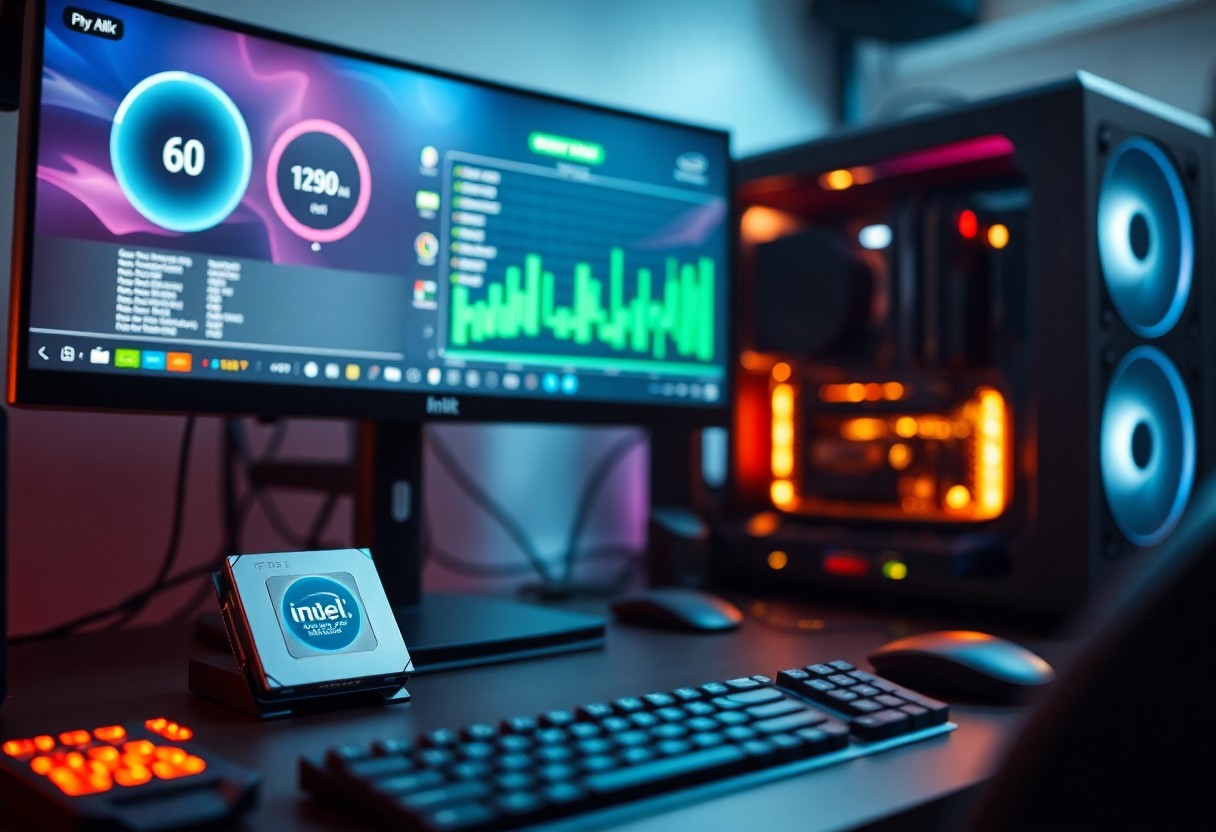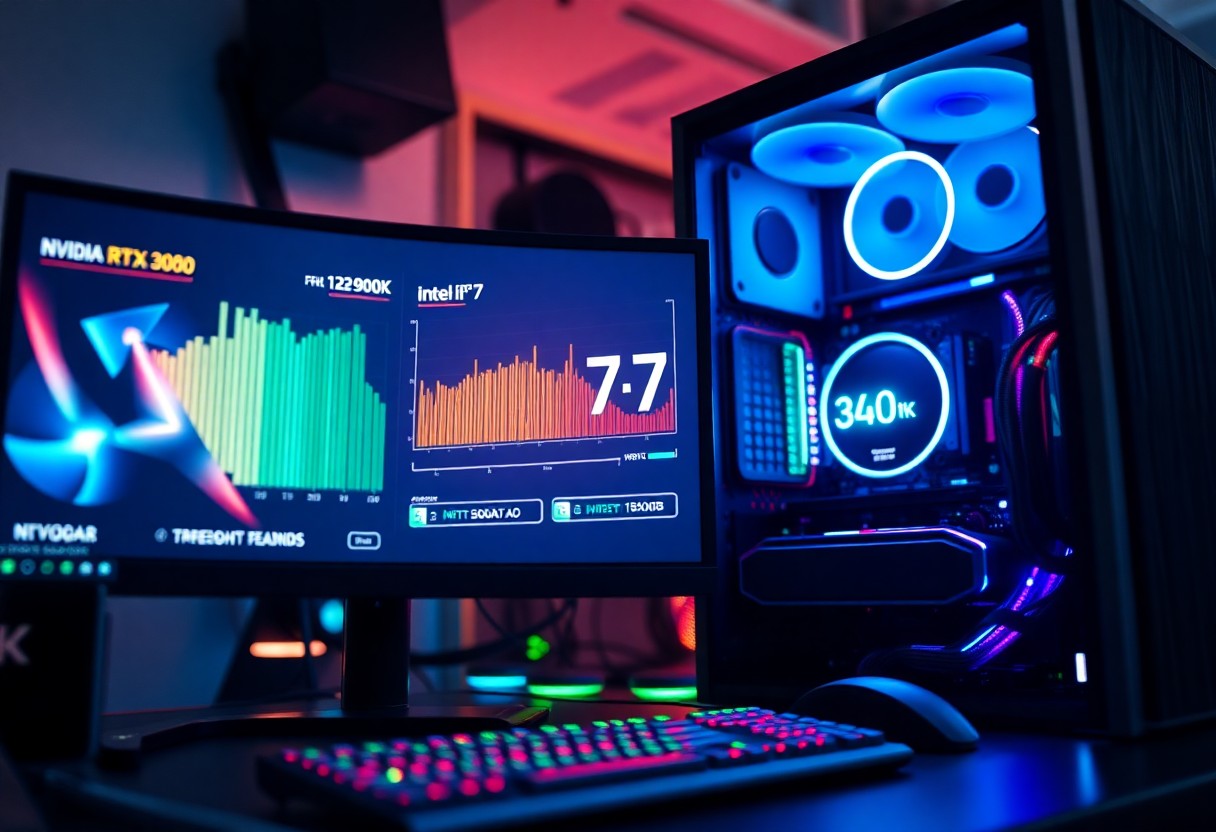PC Bottleneck Calculator
Over the years, gaming enthusiasts have been keenly interested in balancing their CPU and GPU performance. If you’re considering the I7 12th 12700k paired with the RTX 3080, understanding potential bottlenecking issues is necessary for maximizing your system’s capabilities. You may encounter performance limitations that affect your gaming experience, and addressing these factors can ensure that you harness the full power of your setup. In this post, we will explore what bottlenecking means for your gaming rig and provide insights to help you make informed decisions.
Key Takeaways:
- Performance Balance: The combination of an I7 12th Gen CPU and an RTX 3080 GPU offers excellent performance, with minimal risk of bottlenecking in most gaming scenarios.
- Resolution Impact: Bottlenecking is more noticeable at lower resolutions, such as 1080p, where the CPU may limit the performance; at higher resolutions like 1440p and 4K, the GPU typically takes precedence.
- Game Optimization: The extent of bottlenecking can vary significantly between different games due to varying levels of CPU and GPU demand; some titles may benefit from the power of both components, while others may show saturation in one area.
Understanding Bottlenecks
A bottleneck occurs when the performance of your entire system is limited by a single component, impeding overall efficiency. This is particularly relevant when discussing powerful hardware like the i7 12700K and RTX 3080, where you want to ensure optimal performance without any hindrances.
Definition of Bottlenecks
Before diving deeper, it’s important to understand that a bottleneck represents a point in your system where the performance diminishes due to CPU, GPU, or any other component lagging behind in its capability compared to others.
Factors Contributing to Bottlenecking
Across various gaming setups, several key factors can contribute to bottlenecking, including:
- CPU performance
- GPU power
- RAM speed
- Cooling solutions
Any configuration lacking balance may lead to reduced performance in gaming or demanding applications.
Another vital aspect to consider is that inefficiencies in cooling can also lead to thermal throttling, significantly affecting performance. Poorly optimized settings or inadequate hardware may exacerbate the problem, causing your system to underperform. Keep an eye on:
- Overclocking
- Driver updates
- System settings
- Power supply quality
Any adjustments or upgrades in these areas can help mitigate potential bottlenecks.
Overview of the I7 12700K Processor
There’s a significant interest in the Intel Core i7 12700K processor due to its impressive performance characteristics. This CPU, part of Intel’s 12th-generation Alder Lake lineup, combines efficiency and power, catering to both gamers and content creators alike. With its hybrid architecture, it offers a balance of performance and energy efficiency, making it a versatile choice for your computing needs.
Specifications and Features
Before venturing into its capabilities, let’s highlight the key specifications of the i7 12700K. It boasts 12 cores and 20 threads, with a base clock speed of 3.6 GHz and a Turbo Boost potential of up to 5.0 GHz. Supported by Intel’s latest technologies, such as DDR5 memory and PCIe 5.0, this processor ensures you have the latest features for optimal performance.
Performance Benchmarks
Across various benchmarks, the i7 12700K has consistently demonstrated superior performance in both gaming and productivity tasks. Your gaming experiences will be enhanced with smoother frame rates and faster loading times, allowing you to fully immerse yourself in your favorite titles.
Features such as high clock speeds and advanced multi-threading capabilities allow the i7 12700K to excel under heavy workloads. In benchmark tests, this processor showcases its strength, particularly in demanding scenarios, where it competes closely with higher-end models. You can expect a smooth gaming experience and efficient multitasking, making the i7 12700K an excellent choice for your next build.
Overview of the RTX 3080 Graphics Card
All gamers and enthusiasts recognize the RTX 3080 as a game-changer in the graphics card landscape. Launched as part of NVIDIA’s Ampere architecture, it delivers outstanding performance, catering to 4K gaming at high settings. Its impressive ray tracing capabilities and AI-based features provide a stunning visual experience, making it a top choice for those seeking a powerful upgrade in their gaming rig.
Specifications and Features
Overview of the specifications reveals that the RTX 3080 features 10GB of GDDR6X memory and a 320-bit memory interface, enabling high bandwidth and fast processing speeds. With a base clock of 1440 MHz and a boost clock reaching up to 1710 MHz, it efficiently handles demanding tasks. The inclusion of NVIDIA’s DLSS and RTX technology enhances both gaming visuals and performance, ensuring your experience is immersive.
Performance Benchmarks
Card performance benchmarks for the RTX 3080 showcase its ability to handle modern games effortlessly. In various tests, this graphics card consistently delivers high frame rates, even at 4K resolution, making it a superb choice for gamers looking to maximize their machine’s potential.
Even in resource-intensive scenarios, the RTX 3080 maintains a strong competitive edge, producing frame rates exceeding 60 FPS in high-resolution titles. This translates to enhanced smoothness and responsiveness in your gaming experience. However, be mindful that with extreme overclocking and certain titles, you may encounter thermal throttling issues, which can impact performance. It’s vital to ensure adequate cooling solutions when pushing your card to its limits, as this will safeguard your investment while maximizing performance.
Analyzing Compatibility
Despite the impressive specifications of the Intel i7 12700K and RTX 3080, ensuring they work seamlessly together requires a thorough understanding of compatibility. You’ll need to examine your motherboard’s chipset and socket type as well as potential cooling solutions to keep temperatures in check, ensuring optimal performance without throttling.
Motherboard and Cooling Considerations
Compatibility is key when selecting your motherboard for the i7 12700K and RTX 3080. These components will require a socket LGA 1700 motherboard and sufficient cooling solutions, as high-performance CPUs can generate significant heat during heavy workloads. Be sure to select a board that supports PCIe 4.0 to fully utilize the GPU’s potential.
Power Supply Requirements
Behind every powerful system is a reliable power supply unit (PSU) that meets the demands of your components. The i7 12700K and RTX 3080 require a PSU with ample wattage to function optimally, with a recommended capacity of at least 750 watts to ensure stability and performance.
Due to the increasing power consumption of modern CPUs and GPUs, it is important to invest in a high-quality PSU that provides not only adequate wattage but also efficiency through an 80 Plus certification. A reliable PSU will also feature protection mechanisms against overvoltage, undervoltage, and short circuits, safeguarding your components from potential damage. Always choose a reputable brand, and check the required power connectors for both the motherboard and GPU to avoid any compatibility issues.

Gaming Performance and Bottleneck Scenarios
Keep an eye on how your system performs when pushing the I7 12700K and RTX 3080 combo to their limits. While this powerful combination can easily handle most current games, occasional bottlenecks may arise depending on the resolution and settings you choose. Understanding these scenarios will ensure you maximize your gaming experience without encountering performance hitches.
Resolutions and Settings Impact
About gaming performance, the resolution and in-game settings play a significant role in determining how well your system performs. Lower resolutions tend to favor the CPU, potentially exposing bottlenecks, while higher resolutions shift the workload towards the GPU, easing CPU demands. Tailoring these aspects can help you harness your system’s full potential.
Case Studies on Performance Metrics
Among various case studies, notable performance metrics illustrate how different configurations impact your gaming setup:
- 1080p, High Settings: I7 12700K at 120 FPS, RTX 3080 at 95% utilization.
- 1440p, Medium Settings: I7 12700K at 80 FPS, RTX 3080 at 85% utilization.
- 4K, Ultra Settings: I7 12700K at 50 FPS, RTX 3080 at 75% utilization.
A thorough examination of these case studies demonstrates how changes in resolution and settings directly influence your gaming performance. For instance, at 1440p, you see a noticeable drop in FPS compared to 1080p, which might indicate a potential CPU bottleneck. Conversely, when playing at 4K, you shift most of the load onto the GPU, which results in more consistent frame rates despite lower overall FPS. Understanding these dynamics allows you to make informed decisions, leading to improved gaming experiences.
- Game 1 (Cyberpunk 2077): 1080p, 70 FPS, CPU bottleneck observed.
- Game 2 (Call of Duty: Warzone): 1440p, 60 FPS, balanced load.
- Game 3 (Shadow of the Tomb Raider): 4K, 45 FPS, GPU primarily responsible.
Optimizing Performance
Not only can optimizing performance enhance your gaming experience, but it also ensures that neither your i7-12700K nor RTX 3080 is bottlenecked by inefficiencies. By making the right adjustments, you can significantly improve frame rates and overall system responsiveness, allowing you to enjoy your favorite titles without hiccups.
BIOS and Driver Updates
Updates to your BIOS and graphics drivers are necessary for unlocking the full potential of your setup. Outdated drivers may hinder performance and stability, while a BIOS update can introduce new features, optimizations, and compatibility improvements, ensuring your components work harmoniously.
Overclocking and Tuning Options
Driver performance can be maximized through overclocking and tuning options tailored to your hardware. Overclocking can yield significant performance boosts, but be cautious; it may generate extra heat and stress your components. Always monitor temperatures and stability while gradually increasing clock speeds and voltages, as it can lead to improved frame rates when done correctly.
The process of overclocking your i7-12700K and RTX 3080 requires careful consideration and monitoring. Incremental changes to clock speeds and voltages can lead to noticeable performance improvements, but be skeptical of increasing settings too quickly, as this can damage hardware. Utilize tools like MSI Afterburner or Intel Extreme Tuning Utility to monitor temperatures and adjust settings safely. Strive for a balance between performance gains and system stability to make the most of your powerful components.
To wrap up
To wrap up, if you are considering the i7 12700K and RTX 3080 combination, you can rest assured that they work harmoniously together in most gaming scenarios. While certain titles may occasionally show signs of performance imbalance, your gaming experience will largely be smooth and high-quality. By optimizing your settings and keeping your drivers updated, you can maximize your system’s potential and enjoy a seamless gameplay experience without significant bottleneck issues.

